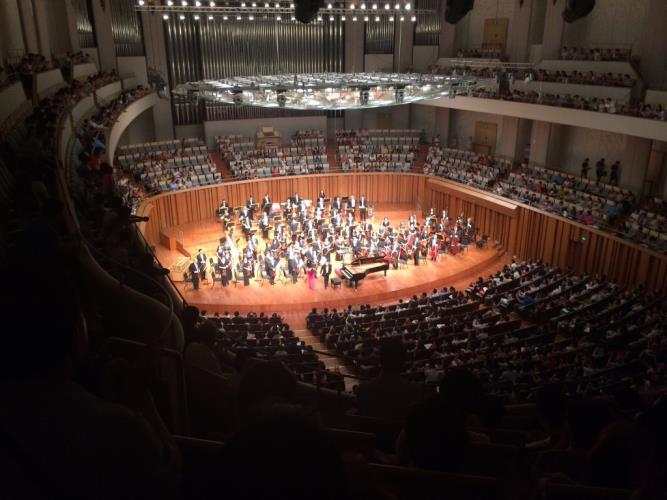A full time researcher in university and an amateur art commentator, Cheong obtained his master’s degree in Public Policy at Willy Brandt School of Public Policy at the University of Erfurt and is formerly a clarinettist of the Erfurt Philharmonic Orchestra in Germany. He loves classical music and now serves as conductor of the orchestra in Escola Choi Nong Chi Tai, by which he can connect art to everyday life. Cheong is also a book lover.

In late May, Macao Foundation and the Academy of Literary and Art of the China Federation of Literary and Art Circles have jointly invited a group of experienced, distinguished cultural practitioners from Macao to attend an arts seminar in Beijing. As one of the invitees, I was able to meet with some distinguished arts leaders from Macao and Beijing. This seven-day trip encompassed many different exchange activities, thematic seminars and screenings, but I would like to highlight two major activities as examples – China National Symphony Orchestra’s show at the Opera Festival 2016 held in the National Centre for the Performing Arts, as well as the conversation with Nao Nao, manager of Drum Tower West Theatre, and Ge Dali, Deputy Director of the National Theatre of China, in which we discussed the appreciation of the performing art scenes in Beijing and Mainland.
Held in the National Centre for the Performing Arts, the Opera Festival featured many masterpieces. However, the competition among fellow musicians has undermined the performance, such that there appeared a lack of texture in the music. Besides, the female alto was suppressed by the chorus. The many adaptations of Western operas in the festival have attracted a sizeable audience, particularly student groups. Sadly, the conduct of the audience was unsatisfactory at the event, with people coughing, re-organising their bags, or even talking among themselves. Some of the audience decided to leave during the concert, while the others appeared rather listless. Even more embarrassing was the fact that some people applauded during the performance. As such, these audience behaviours certainly undermined the event.
On the other hand, the Summer’s Dance performed by the China National Symphony Orchestra could be said disappointing. In fact, although the quality of orchestras on the Mainland has improved significantly, and that their stage performances can be called superb, but the lack of an appreciative audience could adversely impact on the performing arts scene.
In my dialogue with the Deputy Director of the National Theatre of China, Ge pointed out that Macao’s performing arts suffers from a lack of regular productions. After all, arts groups cannot rely on government funding as the latter can only sponsor the occasional shows. The sustainability of the theatre has become an important part of arts development. We talked about the feasibility to introduce Cantonese stage drama on the Mainland, but Ge felt that it is more important to have Mandarin stage drama to attract the Mainland audience. Nevertheless, my personal opinion is that Cantonese stage drama should be preserved. If one were to target the theatre audience in the Pearl River Delta, then there is demand for Cantonese plays. One point worthy of mention is that the National Theatre is funded by the government, and according to Nao Nao, manager of the Drum Tower West Theatre, theirs is the only privately funded performing group in Beijing. Nonetheless, performance venues are obtained from the government at lower rates and therefore it’s relatively an advantage when it comes to renting a property. Since their theatre offers only a few productions each year, they would rent out the venue for staging seven or eight more shows by other theatre groups so as to break-even. Despite a considerable audience, it is still hard for the theatre to survive in this climate.
The performing arts market in Macao has the advantage of a more sophisticated audience group compared with the one on the Mainland. Besides, with the government support for performing arts, these groups have room for sustainable growth. On the down side, the market is small and lacks international reach, causing various theatre groups to compete for audience. Such competition makes is not necessarily good for developing a good market environment. Ideally, more diversity should be encouraged. Looking ahead, emphasis should be placed on growing the audience. To open up the Mainland market, an audience within the Pearl River Delta is important in giving the arts groups more space for expansion, with performance tours on the Mainland being a potential option to consider.